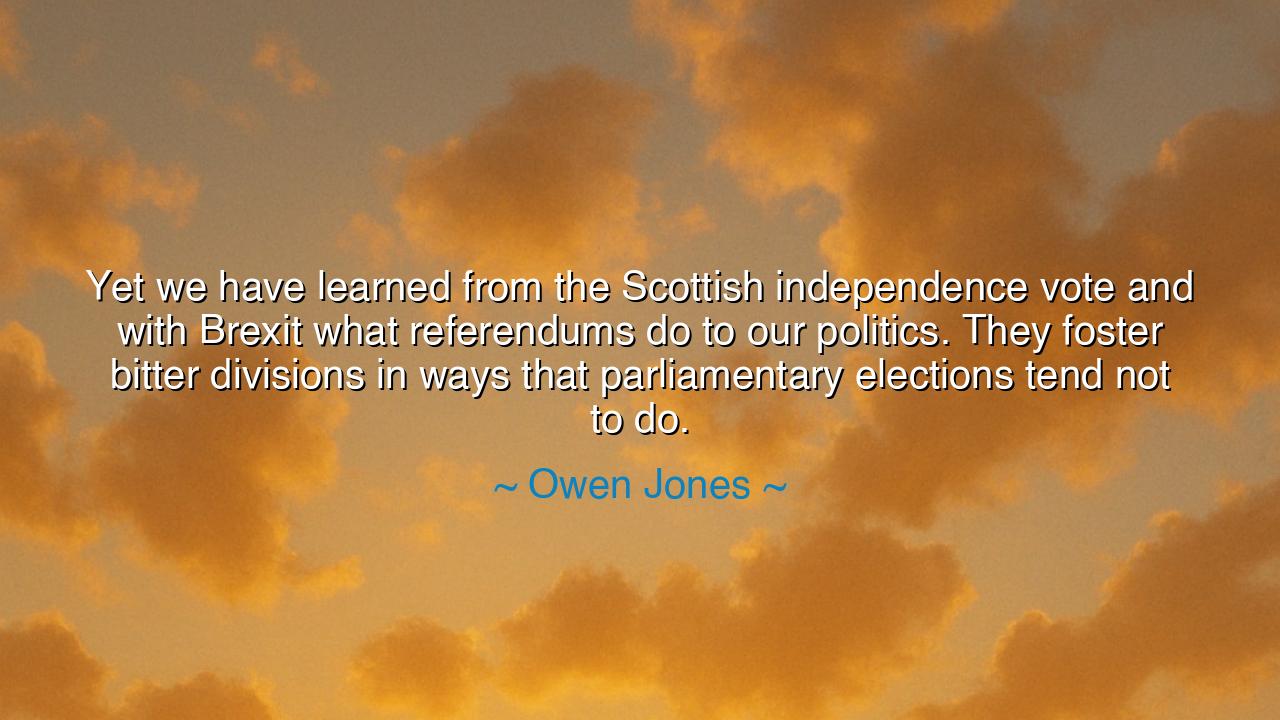
Yet we have learned from the Scottish independence vote and with
Yet we have learned from the Scottish independence vote and with Brexit what referendums do to our politics. They foster bitter divisions in ways that parliamentary elections tend not to do.






“Yet we have learned from the Scottish independence vote and with Brexit what referendums do to our politics. They foster bitter divisions in ways that parliamentary elections tend not to do.” Thus spoke Owen Jones, a thinker of the modern age who, though writing in the age of the internet, speaks with the insight of those ancient philosophers who pondered the nature of democracy itself. In these words lies both lament and warning — a reflection upon the power of referendums, those moments when the will of the people is distilled into a single, irreversible choice. What begins as an act of unity — the people speaking as one — can end as an act of division, for such votes do not merely settle questions; they wound the fabric of a nation’s soul.
To understand his meaning, one must first recall the Scottish independence referendum of 2014 and the Brexit referendum of 2016 — two moments that tore at the heart of the United Kingdom. In both, the people were asked to choose not between parties, but between identities, between visions of what their homeland should be. Such questions cut deeper than policy; they pierce into belonging, memory, and pride. When Scotland voted to remain in the union, and Britain later voted to leave the European Union, the results did not bring peace, but lingering strife. Families were divided, friendships strained, and the nation’s discourse poisoned by suspicion. The aftermath revealed what Jones warns against: that while elections end with victors and opposition, referendums end with victors and enemies.
The ancients too understood this danger. The great Athenian democracy, though proud of its voice of the people, often fell to the passions of the mob. When the assembly voted to execute Socrates, it did not do so out of justice, but out of fear and anger — the twin poisons of populist rule. In such moments, reason is drowned in emotion, and wisdom is silenced by the roar of the crowd. Jones’s reflection is born of the same recognition: that referendums, appealing as they are to the ideal of pure democracy, unleash forces that no institution can easily contain. They transform the public into factions of believers and heretics, of “us” and “them.” And when politics becomes faith, compromise — the essence of governance — becomes betrayal.
Consider the Brexit years, when Britain, long a beacon of pragmatic politics, found itself consumed by tribal conflict. Parliament became paralyzed, its members attacked as traitors or patriots depending on the flag one waved. The very idea of common purpose seemed to vanish. The people, having spoken, discovered that their single answer — “Leave” or “Remain” — concealed a thousand disagreements beneath it. Thus, the nation’s discourse became not a dialogue, but a shouting match. Here, Jones’s wisdom shines like a mirror held to history: referendums do not merely decide the future; they expose the fractures already within the present.
Yet his words are not those of cynicism, but of caution. He does not condemn democracy, but urges that it be guided by humility and understanding. For the parliamentary system, though slower and imperfect, allows for debate, for compromise, for the continual shaping of truth. In the halls of discussion, the heat of division may cool into understanding; but in the ballot box of a referendum, all nuance is crushed into a single word. To govern well is not to ask the people to choose between absolutes, but to trust their representatives to deliberate wisely. The ancients would have called this the virtue of restraint — the art of governing with wisdom rather than impulse.
From this, a greater truth emerges: that democracy’s strength is not found in its noise, but in its balance. A nation cannot live forever at the fever pitch of absolutes; it must also learn the calm rhythm of reason. When the people are asked to decide questions of identity, the wounds run too deep for easy healing. The wise ruler, therefore, must know when to invoke the people’s voice, and when to protect them from the tyranny of their own divisions. As Jones reminds us, democracy is not the act of constant shouting, but the practice of listening — of allowing time, discussion, and empathy to shape the common will.
So, my child of the public square, remember this lesson: freedom demands patience. The right to speak is sacred, but so too is the duty to listen. When you hear calls for grand, all-or-nothing votes — for referendums that promise to end all debate — remember that such promises often birth greater conflict. Cherish the dialogue of democracy, not its duels. Engage with those who disagree, not as foes, but as fellow seekers of truth. For the health of a nation depends not on the loudness of its opinions, but on the strength of its understanding.
And thus, as Owen Jones teaches, let us be wary of those who offer simplicity where there should be depth, certainty where there should be reflection. The truest democracy is not found in a single cry of victory, but in the ongoing harmony of many voices — sometimes discordant, yet bound together by the unyielding thread of shared destiny.






AAdministratorAdministrator
Welcome, honored guests. Please leave a comment, we will respond soon